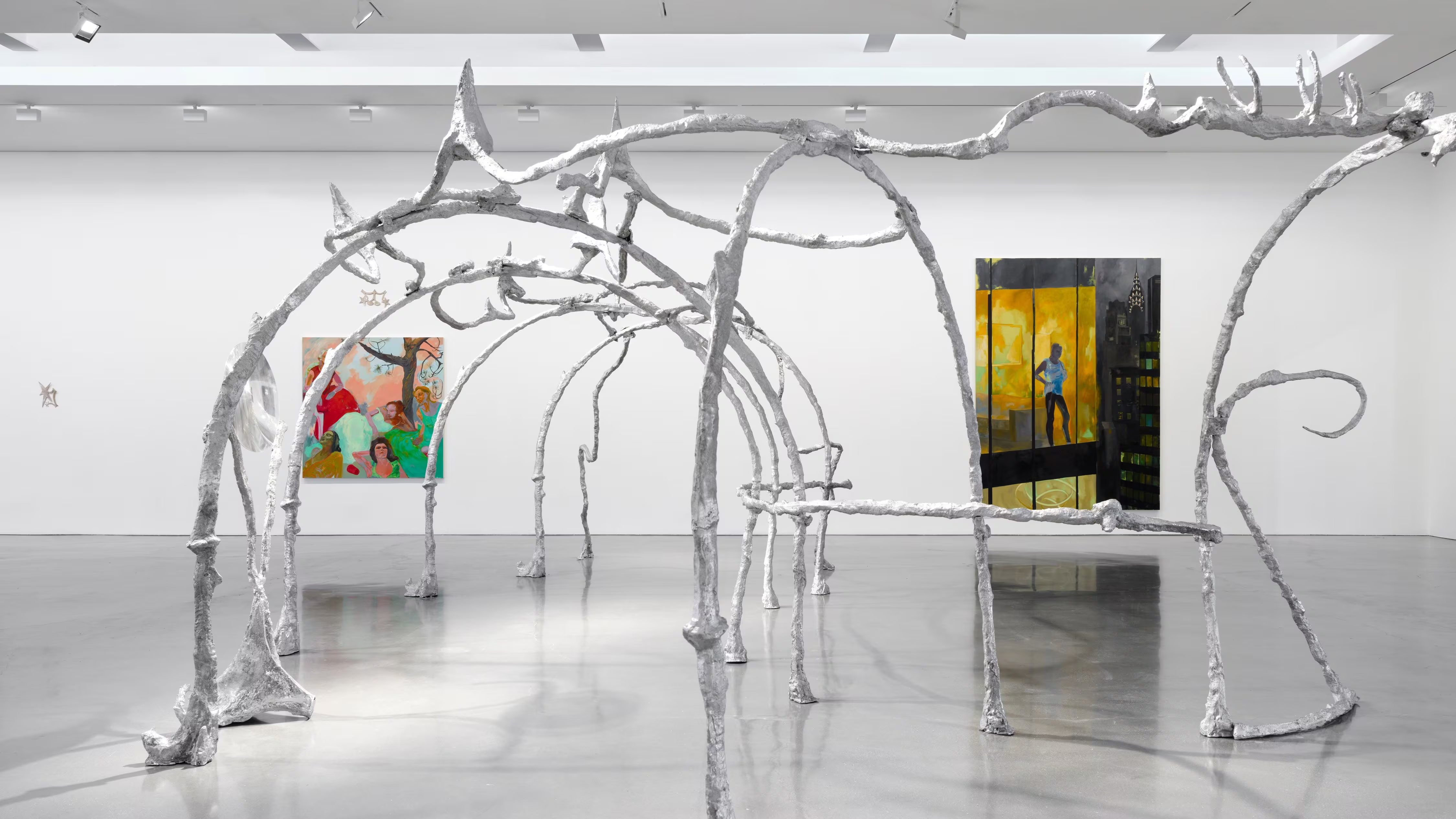
The compulsion to meticulously collect is not universal. If anything, anti-hoarder tendencies in our culture discourage us from taking on too much. Although not overly apparent, obsessive accumulation is the base of Jen DeLuna’s debut solo show “Dust and Sweat and Feigning Grace” at Storage in New York. There, 11 new paintings made this year deliver a sometimes unsettling yet relentlessly compelling depiction of femininity culled from the artist’s robust collection of found photographs.
“I'm on eBay constantly,” says the Boston-based artist of her process. “I'm trolling through, looking for photos. I end up from the thousands I find to about 50 or 10 that I like. And from those, five of them will turn into actual paintings.” While earning her BFA in painting at Carnegie Mellon University, DeLuna gravitated towards analog family photographs from the end of the 20th and beginning of the early 21st centuries, mining local Goodwills and sourcing images from friends. Struck by the unmediated, raw qualities of film and overlapping family vernaculars—celebrations, baby photos, vacations—these domestic scenes became material for the artist to cultivate.
For “Dust and Sweat and Feigning Grace,” the 25-year-old artist’s interest pivoted to photographs of amateur nude models that unexpectedly popped into her collection after she found herself gravitating towards the female form and began searching for vintage images of women on eBay. The first that came up in this query were staged erotic nudes that the artist found natural in a social media-saturated world where images of women are highly doctored. “I understand that they’re still posed and made up, but a lot of times, they look so natural,” she observes. “Things hang in a certain way, the looseness or the folds. It feels so different to me.” In Timid Repetitions, a jubilant, naked woman fluidly hangs in space. The artist’s intervention and manipulation of these images happens on her own terms rather than through a predetermined filter. The works contain a sense of authenticity that emancipates them from societal expectations.

Despite these freeing possibilities, DeLuna’s figures are frozen in frenetic, blurry paint and surrounded by voids. In Looking Forward, a topless model gazes forward straight into the viewer’s eyes. Her body is distorted through a technique that the artist applies to her initial life-like renderings: After she sufficiently obscures her figures by repeatedly going over them with a paintbrush, she applies small, acute highlights to imbue their faces with clarity.
Part of the uncanny nature of the work is that it resides in a pretense of photorealism that the artist intentionally destroys. “What you're looking at looks like it's in movement, but there's also those specks of stillness in the highlights, or like a sweatiness or dewiness,” says DeLuna. A jarring close-up of a woman’s face in Etiquette is so glossy it is almost off-putting, with a wetness that exudes tension. In the tight framing, a single, wide-eye looks downward from the corner and erases any notion of a sexy model, instead recalling a horror-movie still stretched with anxiety. The almost distraught nature, which is not found in the original photograph, amplifies the voyeurism that both the artist and viewer participate in.
Three paintings featuring black dogs in the show display a stark juxtaposition to the vulnerable portrayals of women. In the first image, Let Sleeping Dogs Lie, a sizable canine is held at its owner’s waist as it looks outwards with shiny eyes. There’s certainly a cutesiness to the animal that is undercut by the chain around its neck and the palpable restraint of red-nailed human hands against its muscular body. For DeLuna, dogs are emblems of domesticity. “They're so close to our lives as people,” she explains. “At the same time, they're also an animal. They're also a beast, and they have this aggression.” What then is the relationship of these dogs to the women? Do they pose a danger, offer protection, or are they meant as a point of comparison—possibly all three?

Rounding out the exhibition, an isolated diptych of a girl in a white dress is split vertically between two paintings. The cropped image cuts off the head and waist, leaving the show with an ambiguously chaste note. “Dust and Sweat and Feigning Grace” presents a refreshing and sophisticated array of images that signal the beginnings of a fruitful career for an emerging artist. DeLuna’s paintings could earn comparisons to artists like Gerhard Richter, Marilyn Minter, and even more contemporary painters like Chloe Wise and Issy Wood; however, the artist’s engagemet with found photography is highly personal and sincere. It's an intuitive process,” she says of working with her ever-expanding archive of found images. “I hold on to them for a long time until it feels right.”
Jen DeLuna: “Dust and Sweat and Feigning Grace” is on view through August 30, 2024 at Storage in New York at 52 Walker St, 4th Fl, New York, NY 10013.

















.avif)


_result_result.avif)



.avif)

_result_result.avif)

_result_result.avif)
.avif)

_result_result.avif)


_result_result.avif)


.avif)




.webp)

.avif)















%20(1).avif)
.avif)




.avif)












.avif)


.avif)





















.jpeg)

.avif)

_11%20x%2014%20inches%20(2).jpg)







.avif)

.jpg)

%20(1).jpg)
.avif)
.jpg)

.jpg)
.webp)


.webp)



.webp)


.webp)


.avif)












.avif)
.avif)















.avif)



.avif)




















-min_result.avif)









.avif)







3_result.avif)
_result.avif)






_result.avif)




.avif)




.avif)













_result.avif)




%2520(1)_result.avif)
_result.avif)


_result.avif)

_result.avif)
.avif)

.avif)






.avif)

.avif)










.avif)



.avif)


_result_result.avif)
















-min_result.avif)






.avif)
.jpg)
















_result.avif)

.avif)


.avif)







.avif)





.avif)

_result.avif)



.avif)




.avif)









.avif)


.avif)














.avif)




.avif)








.avif)

.avif)

.avif)



.avif)


.avif)




.avif)

.avif)

.avif)
.avif)
%20(1).avif)
.jpg)

%20(1).avif)








.avif)
.avif)

.avif)






.avif)


.avif)
.avif)



.avif)
.avif)
%20(1).avif)

.avif)


















.avif)
.avif)
